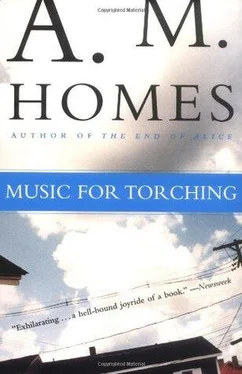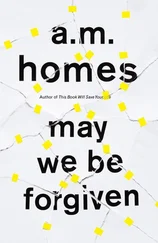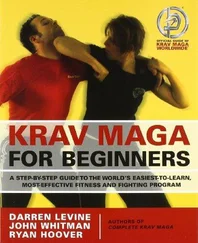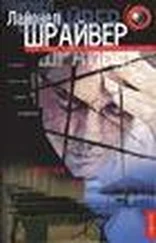"Excuse me," he says to the fellow sitting next to him. "Could I borrow a pen?" The man hands Paul a pen, and Paul writes on his hand. Insurance. Stonemason. Painter.
"You forgot Baker, Banker, or Indian Chief," the man says.
"Pardon?"
"I used to do that all the time. I hated my job, and on my way to work I would make lists of all the other things I could do."
"Oh," Paul says.
"And then I gave up all hope of fruition." The man smiles warmly. "Bob Becker," he says, extending a hand. "CEO Pathways International."
"Pharmaceuticals?"
"That's the story-mental medication, smart drugs, target your transmitters, re-uptake inhibitors. And you are?"
"Paul. Paul Weiss," Paul says, handing back the pen.
"Ah, and Rifkind?" the man asks, as though this were a Beckett play. There is an air of unreality about him; everything means something, and then it also means something else.
"No Rifkind," Paul says. And "Rifkind" comes out sounding like a word, a word that means something, like-"Pretty good, and yourself?"
"Let's take a look at your list," Becker says, eyeing Paul's hand.
"It's not really a job list," Paul says, holding his hand close to his chest. "It's more along the lines of things I've got to remember to do, things to be taken care of."
"Well then, let's look at your palm." Becker tugs at Paul's
hand, spreading the fingers, rubbing the seat, the heart, the soft spot in the middle, blurring Paul's notes just a little bit. "Interesting…" Becker says. "You've got a lot going on and a lot more to look forward to."
As the train pulls into Grand Central Station, Becker pulls Paul's hand closer still, pressing his lips into Paul's palm. "Good to meet you, my friend," he says. "All good luck."
There is the rush to exit the train. Paul is jostled, caught in the moment that just passed. His palm is tickling, reeling from the kiss-was it a kiss?
He rises up on his toes and looks for Becker, but Becker is gone.
On the subway, Paul tries to forget what happened. He thinks about work. He is looking forward to hunkering down behind his desk-regrouping, organizing. He will take the bull by the horns. He will make lists, phone calls, appointments. His chest is tight. He rushes to get to the office. If he can just get to the of- fice-tag base-he will be okay. He will talk to people. He will ask their advice, he will ask them for names of other people, people who can help him, people who can fix things. He wipes his palm back and forth on his thigh.
"Good morning," his secretary says as he comes through the door.
"Nice suit," a woman from a higher floor says.
"Thank you," Paul says, forgetting that the suit belongs to George.
He is smiling. He is glad to be there. It's morning, bright and early. Well, almost.
"I forgot my briefcase," Paul says, swinging his arms giddily back and forth like a little boy, explaining the lightness of his load. "Just walked out without it. Plumb forgot."
"Your friend George brought it by, about four minutes ago."
Paul stops swinging. How did that happen? Where was
his briefcase? And more important, how did George beat him into the city?
"He said he'll see you tonight at dinner, but if you have any questions or need him before then, feel free to call at the office."
George is good, Paul thinks. And he is fast. Maybe he's a little too good. Paul wants to call him. He wants to ask George a couple of quick questions: Did ya see the tatas on Miss October? Think those were implants? Hey, what do you know about nipples? What happens to the nipples when they put in implants?
"What else?" he asks his secretary.
"Warburton wants a response to the report."
Paul stares at the secretary, who's still holding the briefcase.
"The report. I put it in here on Friday." She pats the side of his briefcase.
"Never got to it," Paul says, feeling as though he's saying the dog ate it. "There was a fire. We were in a motel. I forgot."
"I'll stall," the secretary says.
"I'll read," Paul says, taking the briefcase into his office.
His secretary puts through a conference call from Henry.
"Menage a trois," the date says.
Paul doesn't say anything.
"Come on," Henry says. "Play along. I'm Bond, James Bond."
"I'm the Russian spy," the date says.
"And who am I?" Paul asks.
"A diplomat from the UN," Henry says.
Paul's secretary interrupts. "You have a meeting in ten minutes."
He puts his hand over the receiver. "In eight minutes, knock on my door."
"Of course," the secretary says, closing the door.
He goes back to the phone. Henry is talking to the date in a poor imitation of Sean Connery. The date moans with a Russian accent.
Paul listens.
Paul thinks about his hand; the kiss is still on his palm, and he has to pee. He needs to wash his hands, and he needs to pee, and he thinks it would be odd to walk into the men's room and wash your hands before peeing. He doesn't want to act strangely, and he doesn't want to touch himself with the kiss still in hand. He will wait, wait to wash his hands, wait to pee. He will do work, he will touch other things. The kiss will wear off; it will erase itself.
He buzzes his secretary. "Could I have some coffee, please?"
A few minutes later, when she hands him the cup, he "accidentally" splashes a little on his hand.
"I'm sorry, did I scald you?" the secretary asks.
"Not at all," Paul says, smiling, blotting his hand with a napkin, wiping himself clean.
They work. Whatever room her mother is in, Elaine is out of. Her mother's presence, the annoying surety of her opinions on everything from the organization of the refrigerator shelves to the right way to fold a towel, fills Elaine with rage. The resulting chemical surge propels her. She works harder, faster, and more thoroughly than she would if left to her own devices. She strips the beds, gathers the smoky sheets, towels, clothes, etc. With a bucket, a sponge, and her own concoction of Murphy's, Windex, and 409, she erases the thick footprints of the firemen. She works her way around the house-a poor man's Pat, a person who has to be pissed off in order to be productive.
At a certain point she comes downstairs to refill her bucket. Her mother has mixed a defrosted can of lemonade concentrate with a bottle of flat seltzer.
"You and I have to have a serious talk," her mother says, pouring Elaine a glass.
This is the moment Elaine's been waiting for: the reprimand. Her mother will tell her to get her act together, straighten up and fly right.
"The other day, I was trying to tell your father something," her mother says. "I wanted his opinion on the sofas in the living room. I'm thinking of re-covering them. I found fabric, but it's expensive.. And then I started thinking, maybe we should just get new sofas." Her mother stops, looks at Elaine as if to ask, "Are you with me?" She goes on. "And so I said to him, 'It'll cost us to recover, and it'll cost us to replace. Six of one, half dozen of the other.'"
Elaine listens attentively, hoping this is a parable, hoping the punch line at the end will be filled with import and meaning.
"Now, I don't know how much you know about furniture.."
Suddenly, Elaine can't listen anymore; the story is entirely irrelevant. She's busy beating herself up: Why are you so gullible? Why do you get suckered in? Why do you always think this time it will be different? Why do you always have hope? What kind of an idiot are you?
Elaine starts to cry.
"Is it the drink?" her mother asks. "You don't like the drink? It's a little sweet-maybe there's not enough seltzer."
"I'm unhappy. I burned my house down, and I'm really unhappy," Elaine says.
"What would you like me to do?" her mother asks, defensively. "You're too old for me to do anything. Do you want to come home? Do you want me to take you back to my house?"
Читать дальше












